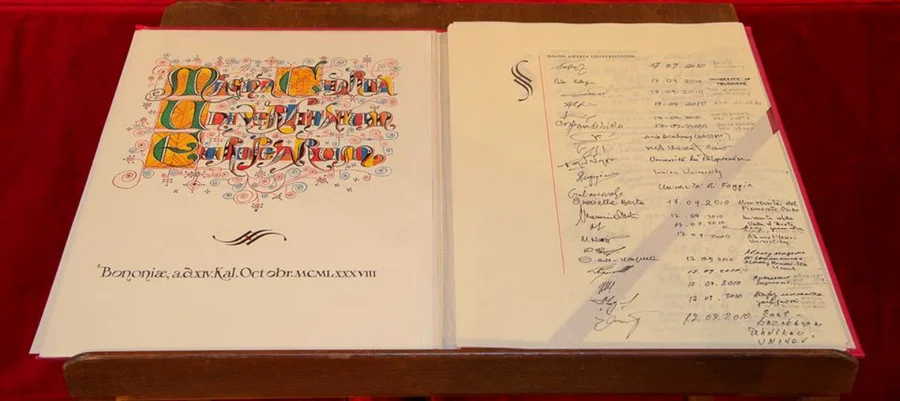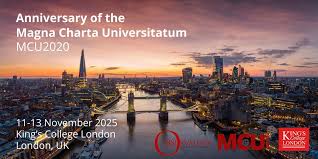This week King’s College London hosted the Anniversary of the Magna Charta Universitatum (MCU), a celebration and exploration of the fundamental values of being a university. Over 200 universities have gathered to discuss ‘What are universities for? Higher education principles, values and responsibilities in a fragmented world’. Over three days, participants engaged in keynote addresses, panel discussions, and interactive sessions exploring the evolving role of universities amidst global challenges. KCL President Shitij Kapur and Professor Liviu Matei explain, “Affirming shared values will help academic freedom weather the storm”.

37 universities signed the Magna Charta Universitatum for the first time on 13 November, taking the total number of signatories to 1012. A further 31, who had already signed the new Magna Charta virtually, signed in person during the ceremony, making this the largest ceremony since the original one in 1988.
I was asked to provide the keynote speech to the banquet in the Great Hall of KCL on Wednesday night, 12 November. My remarks to:
Anniversary of the Magna Charta Universitatum MCU2020
What Are Universities For?
Higher education principles, values and responsibilities in a fragmented world
11-13 November 2025, King’s College London
President, Secretary General, Council Members, and our host, President Kapur:
To begin:
“Forty score and ten years ago” our forefathers brought forth on this continent, a new charter, conceived in liberty …
I’ve always wanted to have an occasion to open a speech like Abraham Lincoln. I have been asked to welcome you tonight because I served last year as Lord Mayor of London, and therefore know a thing or two about charters.
So, first and foremost, a very warm welcome to London.
As for charters, you can’t be a Lord Mayor without a deep appreciation of our two millennia old City. Today, the City of London is the world’s oldest democratic workers’ and residents’ cooperative, holding continuous elections since the 7th century. As the most significant city in England, we know a thing or two, or even four score, about charters to fend off a ravenous monarchy.
Things got especially tense right here in 1066 when the Norman King William invaded England. Here, in Fleet Street, just outside the traditional Roman Wall boundaries of the Square Mile, you may know him as William the Conqueror. Just a few hundred meters to the east etiquette demands that he is strictly known as William the First. He never conquered the City. We negotiated our first charter with him, with difficulty, the Charter of William in 1067. I say first, because there were quite a few more with various monarchs, about four score.
Charters are basically negotiated connections among institutions. Preparing for tonight, I wondered what the collective noun for charters might be, particularly as you can also charter an airplane, charter a yacht, as well as charter a city or a university. May I suggest that the collective noun is a ‘fleet of charters’, most appropriate as we are here at one end of Fleet Street while on the other, about 500 yards away, lies Temple Church, which featured strongly in charter negotiations of 1215.
Exercising this new collective noun, fleets of charters proliferated between the monarchy and City: in 1132 negotiated with King Henry I; in 1189 negotiated with King Richard I; and numerous charters with duplicitous King John, including the Shrievalty Charter of 1199 and the Mayoralty Charter of 1215.
In London in 2015 we celebrated 800 years since King John negotiated one version of a ‘grand’, a ‘magna’ charter with his barons, including one of my predecessors, the then fourth Lord Mayor of London, William Hardel. 2025 marks 810 years since the almost definitive version of Magna Carta was agreed with John’s son, Henry III. Magna Carta has come to symbolise the beginning of the rule of law because it asserted that royal authority, even in a world of divine kings and feudalism, must operate within a legal framework.
While the UK government legislation website still lists the 1297 edition of the document, it also adds, in a somewhat wistful tone, that “there are currently no known outstanding effects for the Magna Carta”. There are few direct continuities to the present, but many points of inspiration arose from the Charter, including this week’s assembly. Magna Carta was an inspiring process, not a document.
One of my language teachers, Signora Semita, never ceased to remind her students of the antiquity of her alma mater, Bologna. Now it’s almost forty years since the 900th anniversary festivities for the University of Bologna in 1988 set out in the Magna Charta the main principles and values the universities can recognise as their common European inheritance. One historical connection between Italy and the Magna Carta is that Dante Alighieri mentions King John’s son, Henry III, in the Divine Comedy, not exactly in a great light – Henry III of England, “Arrigo d’Inghilterra” (1216–1272), waiting dolefully in the “Valley of the Negligent Rulers” as a late-repenter about to enter Purgatory having battled his own people, like his father, over their rights.
Last year’s Mayoral theme was Connect To Prosper, celebrating the many connections of the City with the 40 learned societies, 70 universities, and 130 research institutes within two miles of here tonight. As especial treasure is Gresham College, founded in 1579 which opened its doors in 1597. It has been giving lectures free to the public for over four centuries, a Tudor TED if you will. It was here before UCL and King’s tonight opened their doors in the 1820s.
Over a millennium and more, our City’s strategy exhibits three virtuous components – create wealth, improve our business & physical environment, and share our prosperity. Our City economy is built on four longstanding themes that would have strong analogues in any university:
- Defence and security – remember, people don’t bring money to a war zone, nor to a cybersecurity hazard;
- Rule of Law – in its widest sense, arbitration, mediation, expert determination, conciliation, and an all-round fair environment – our City motto is “meum dictum pactum”, “my word is my bond”;
- Free, fair, and open trade with all;
- Access to the world’s best talent and skills.
But all these strategic components and themes are summed up in one fundamental rule – “treat all comers fairly”. This is the vital shared value between our City and the Observatory – “treat all comers fairly”.
Now, as one of my three almae matres has been particularly threatened lately, Harvard, I feel keenly the need for the Magna Charta; not just with other universities, but with governments, political parties, corporations, faculties, scholars, and all social institutions. We must be guardians of the “Souls” of our Universities.
- Universities serve society by seeking truth, not serving power.
- Universities must be free to pursue and share knowledge.
- Scholarship should not be controlled by governments, markets, or politics.
But this is not ‘freedom from’, as ever responsibility calls for ‘freedom to’. In line with theologian Timothy Radcliffe, I believe that we have freedom to learn to talk with strangers.
Education, and particularly higher education, in an age of automation, is of utmost importance to humanity. AI and other technologies challenge our concepts of what it means to be a human being. Universities should esteem humanity at the core of life – with guiding principles of autonomy, beneficence, non-maleficence, and justice. I would encourage us to work harder on extending our charter – binding the world to our principles and values. Magna Charta Universitatum is an inspiring process, not a document.
While many historical institutions are veiled in myths, think of the Hanseatic League, myth inspires. Magna Carta didn’t in truth ‘treat all comers fairly’, rather it treated ‘all barons fairly’. Our historical lenses are heavily tinted with myth as we try to make Magna Carta relevant to today’s Magna Charta. Yet myths, like good wines, sometimes age well and grow in potency. Life is all about Continuity and Change.
So let us thank the team at Magna Charta Observatory for this event in our process together. Let us congratulate ourselves on what has been achieved. Let us treat all comers fairly.
May I ask you all to rise and be upstanding, and join with me in a toast to – “Magna Charta Universitatum, may if flourish root & branch!”

Dante’s text Purgatorio, VII, 130-132:
Vedete il re de la semplice vita
seder là solo, Arrigo d’Inghilterra:
questi ha ne’ rami suoi migliore uscita
Behold the monarch of the simple life,
Harry of England, sitting there alone;
He in his branches has a better issue.

